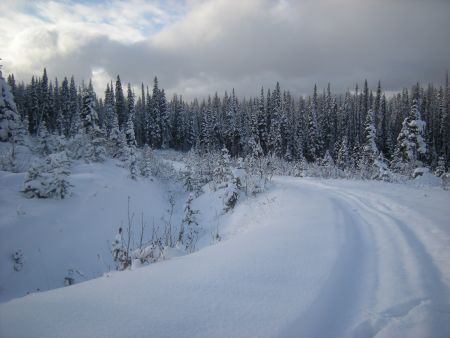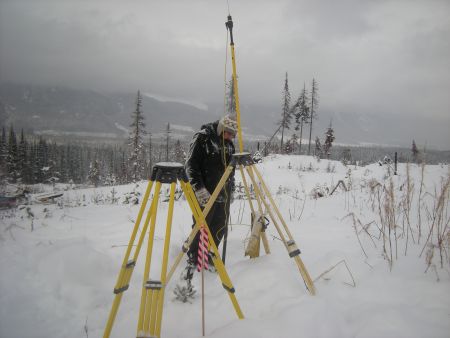STORY about Indigenous posted on December 6, 2012 by julienlalonde
Unist'ot'en Camp Resistance:
Colonial Law Cast Aside on Unceded, Autonomous Indigenous Territory
Also posted by julienlalonde:
Also in Indigenous:
On the morning of November 20th, 2012, Freda Huson, spokesperson for the Unis’tot’en clan of the Wet’suwet’en encountered materials left behind by PTP surveyors at 48 km on the Morice River Forest Service Road West.
Later that evening, a crew of surveyors was intercepted at the cabin site entering Unis’tot’en territory. In the absence of Freda Huson, Toghestiy, hereditary chief of the Likhts’ amisyu clan of the Wet’suwet’en invoked biKyi’ waat’en, the right of the husband, in telling the industry surveyors to immediately leave the territory, and issued an eagle feather to the crew. In Wet’suwet’en law, an eagle feather indicates a first and only warning of trespass.
The surveyors in question were field workers of Can-Am Geomatics, a surveying, engineering and mapping company out of Fort St-John, BC. The workers who were intercepted on the bridge across the River Wedzin Kwa admitted to being contractors for Apache, the lead energy company in Kitimat LNG, the consortium in charge of the Pacific Trails Pipeline project (PTP). The crew asked permission to be allowed to return the following morning to retrieve equipment they had left behind at the surveying site, which was granted by Toghestiy. However, the crew was also informed that they would be subject to a Free Prior and Informed Consent Protocol before reentering Unis’tot’en territory, and given a stern warning that they, or any pipeline industry workers were never to reenter Wet’suwet’en territory afterwards.
The surveyors in question returned the next morning and were engaged with the Free Prior and Informed Consent Protocol, but after deliberation from the Unist’ot’en camp group they were denied access to the territory.
After the surveyors were turned back, a crew from Unis’tot’en camp snowmobiled some 20 kms out to Crystal Road to retrieve materials left behind by the work crew the previous day. The materials were successfully confiscated and brought back to camp where they are being held until Apache and PTP agree to open up appropriate lines of communication with the Unis’tot’en and grassroots Wet’suwet’en according to the Free Prior and Informed Consent Protocol and laws of their sovereign unceded territories
In the days following the encounter with the Apache surveyors, a small media explosion occurred covering the activity and the subsequent blockade on Unist’ot’en territory. Much of the reporting was lazy and dotted with inaccuracies. For example, Dene Moore of the Canadian Press wrote on November 21st, “officials with the Wet’suwet’en, a First Nation comprised of five clans — none of which is identified as the Unis’tot’en on their official website — did not return calls seeking comment.”
The clan in question mentioned by Dene Moore is known traditionally as both the C’ihlts’ehkhyu (Big Frog clan) and the Unist’ot’en, but the Office of the Wet’suwet’en (OW) chooses to identify with the former title in an attempt to discredit and isolate the mostly grassroots, traditional, and sometimes more militant membership of the Unist’ot’en. Furthermore, the website that is referred to, that of OW, is not “their official website,” and the Office of the Wet’suwet’en is not the representative of the Wet’suwet’en people, it is an illegitimate colonial proxy-institution that remained after all five clans of the Wet’suwet’en opted out of the treaty process in 2008. Today the Office of the Wet’suwet’en remains as a hub for corrupt elected chiefs to sign up-front deals with industry, which normally come with cash incentives. Most recently, OW has signed confidentiality and communications agreements with PTP and are trying to reignite the defeated treaty process with the government.
There is also issue from many of the Wet’suwet’en with the term First Nation, which is the designation in name placed onto native communities by the colonial government. The grassroots Wet’suwet’en are not a First Nation because they continue to operate according to their traditional system, their lands are unceded, and they are not under treaty with the Canadian government. First Nation is also a term that has come to be used by the Canadian state in referring to band councils, and a false label to place often irreconcilably divergent interests under the same umbrella. Under Canadian law, a band is defined as a "body of Indians for whose collective use and benefit lands have been set apart or money is held by the Canadian Crown, or declared to be a band for the purposes of the Indian Act," a definition which makes clear that band councils are extensions of Canada’s colonial infrastructure.
It is time that mainstream media and the colonial government stop misrepresenting the nature of band councils as representative of entire communities. The band council is a neo-colonial institution composed of elected chiefs, which in the case of the Wet’suwet’en, undermines and disregards the traditional hereditary system that has existed since time immemorial. By imposing the electoral process on a traditional system, the government engages in an act of political and cultural colonialism by replacing hereditary chiefs with elected band councils and traditional territories with Indian Act reservations.
In fact, the reservation system amounts to not much more than a form of well-disguised western contemporary apartheid. The Britannica Online Encyclopedia, albeit relating to the former policy of the National Party in South Africa, defines apartheid as "racial segregation and political and economic discrimination against nonwhites.” It would follow that if segregation is defined as “the separation or isolation of a race, class, or ethnic group by enforced or voluntary residence in a restricted area, by barriers to social intercourse, by separate educational facilities, or by other discriminatory means,” then the social and political policy of the colonial Canadian government of taking people off of their lands based on their culture and ethnicity and placing them within demarcated territorial boundaries certainly qualifies as racial segregation, and stealing their lands and handing them off for the profits of private corporate interests certainly translates to political and economic discrimination.
On November 27, 2012, a day of action across Turtle Island was held in solidarity with the Grassroots Wet’suwet’en. In a letter addressed to industry and government, the Unist’ot’en wrote:
“To the illegitimate colonial governments of Canada and British Columbia, and to all parties involved in the proposed Pacific Trails Pipeline (PTP) project: Apache corporation, EOG Resources, Encana corporation and all of their affiliated investors, including the Royal Bank of Canada, Jarislowsky Fraser Ltd., and many others…. Wet’suwet’en territory, which extends from Burns Lake to the Coastal Mountains, is sovereign and unceded territory which has never been ceded to the colonial Canadian state… Under Wet’suwet’en law, the people of these lands have an inalienable right to their traditional territories, and the right to defend it…. As such, any further unauthorized incursion into traditional Wet’suwet’en territory will be considered an act of colonialism, and an act of aggression against our sovereignty….”
With the Free Prior and Informed Consent Protocol the grassroots Wet’suwet’en aim to undo the colonial racism that has been wrought on their territories and communities for decades and centuries. They aim to do this by reclaiming their territories for future generations, and for the ecological future of the earth. One of the greatest necessities in addressing the global ecological crisis is the imperative to localize our economies, and this also requires us to localize our communities. As such, this new emancipatory process that the grassroots Wet’suwet’en have adopted offers an opportunity not only for political and cultural decolonization, but for the creation of healthy, local, and sustainable communities. The collective aspect of their strategy is that they are not claiming ownership over the grassroots FPIC protocol, but actively encouraging other clans, nations, and territories to do so as well. The Free Prior and Informed Consent Protocol is the phasing-out of borders and barriers infringing on human movement and freedom via the practice of indigenous localized territories exercising community sovereignty and autonomy. It is a step forward towards an eventual world without state borders.
Julien Lalonde is a writer and community organizer who focuses on ecological justice, horizontal organizing, and creative resistance. He is currently organizing from the Unist'ot'en Resistance Community on traditional Wet'suwet'en Territory. Julien blogs at culturesofresistance.wordpress.com and is co-editor of westcoastpipelinewatch.wordpress.com.
The site for the Vancouver local of The Media Co-op has been archived and will no longer be updated. Please visit the main Media Co-op website to learn more about the organization.


Comments
Wet'suwet'en Hereditary Chiefs
(the following is my own interpretation, criticism or support appreciated)
Thank You for the information.
I've been trying to better understand the FPIC protocol.
And the information really helps.
What is interesting,
if I understand correctly?
Even the B.C.Treaty Commission,
acknowledges negotiations are with
Wet'suwet'en Hereditary Chiefs,
in this information below found in the B.C.Treaty Commission annual report 2012?
(I don't know how accurate all the information is?)
But it is clear that any negotiations are being held with the Wet'suwet'en Hereditary Chiefs.